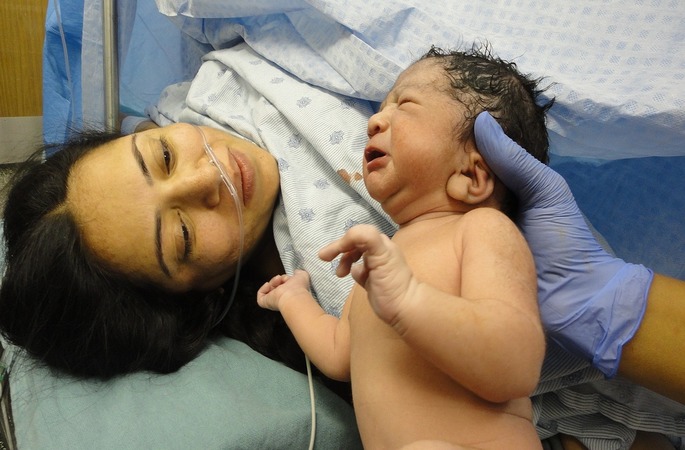Out in Nepal awaiting successful immigration to the U.S. – a wait that seemed endless – I was quite anxious but hopeful.
I am referring to an incident from the pages of my life when I was on a wait which seemed like infinity for acceptance by the U.S. Immigration Department.
I was in Nepal, and my pregnant wife had just left me for the U.S., where she had later given birth to our baby girl.
The sole cause of my anxiety was the events and unfortunate circumstances which unfolded immediately following the full medical delivery.
The dread and anguish of being distanced by ten thousand miles from your pregnant wife and newborn baby, and not being able to hug them both when they needed you the most, was nothing compared to the agony and bewilderment I encountered when the doctors in the U.S broke the dreaded news.
Right after the delivery, my wife suffered from severe postpartum haemorrhage. She had to undergo several operations and admissions for more than a month in the Intensive Care Unit (ICU).
There she hung on to her dear life, tracheostomy tubes and intravenous lines sticking out of her nearly-lifeless body. She was unable to recognise anybody: including me from afar, and our baby from up close. Even when she’d momentarily come to her senses, she would immediately go unconscious.
It was such torment and dilemma for us a family. And again being distanced by ten thousand miles, didn’t and wouldn’t help, when all I could see was my wife’s almost-lifeless, pale body and a few glimpses of my newborn, through the pictures that my wife’s doctors and nursing staff had sent me.
A litany of tyranny befell my life, our life.
Imagine what magnitude of pain I might have experienced when my wife, though she delivered our child in the USA, one of the most advanced nations in the world regarding medical care and expertise, suffered a fate not very different from the thousands of women in our part of the world.
I have seen women giving birth in Nepal where I worked as a junior doctor with a team of family physicians and obstetricians, with limited resources and in a semi-rural setting.
Lack of adequate nutrition in the diet of the childbearing women, malnutrition, multi-parity, multiple pregnancies, defective uterus, lack of proper education, lack of appropriate medical resources, equipment, etc. are some of the challenges we face in our part of the world where the mortality rates among pregnant women are quite high.
The most frequent causes of problems during and after the delivery process include post-partum haemorrhage, hypertensive diseases in pregnancy, like preeclampsia and eclampsia, and undernourishment in would-be mothers, to name a few.
One might wonder, how could my wife’s delivery have gone wrong at this USA hospital where conditions, regarding the medical resources and technological competence, were entirely different?
This question begged for an answer. It brought me to delve into research in the condition of women during pregnancy and labour in the USA. I was amazed to discover, despite the technological advancements and advancements in medical expertise, the U.S. still lagged behind when it comes to childbirth and related cases.
Thousands of women dying in childbirth in one of the most advanced nations in the world came as a shock to me.
Later, luckily, my wife’s condition improved, and both mother and baby were doing well. I breathed a sigh of relief, after my reunion with them in the U.S. The total number of ICU admissions in my wife’s case was for a few days in the ICU immediately following medical delivery, and a total stay of one week in the hospital. But she needed to take continued medications for months after leaving the hospital, to help support her heart and kidneys.
But it still makes me think deeply. Could the high mortality rates in childbearing women in the U.S be attributed to their cultural origins?
Women like my wife, who belongs to the immigrant community, have grown to adulthood in limited resource settings in developing countries where nourishment of the population, especially the female population, is classically dismal or less than praiseworthy.
Could these contexts have led to such catastrophic outcomes?
Nourishment of women through an overlooked issue is a frequent contributor to difficulties and mortalities during childbirth. Childbirth is a problematic endeavour where a woman’s body protects and nourishes her baby. The baby sustains itself from its mother’s nutrition and oxygen through the umbilical cord.
While developing countries like my homeland Nepal and other Third World countries are progressing in pregnancy care, ensuring reduced mortality during childbirth, where does the USA stand?
Is the situation less than praiseworthy in a country like the USA?
Isn’t it time for the concerned to analyse the situation and help foster a more conducive environment and outcomes for women during childbirth, not just for millions of immigrant women who call America their home, but also for the first generation American women themselves?
The U.S. health system needs to provide comprehensive care for its women, no matter if the mother is Asian or non-Asian, white or black, poor or wealthy.



